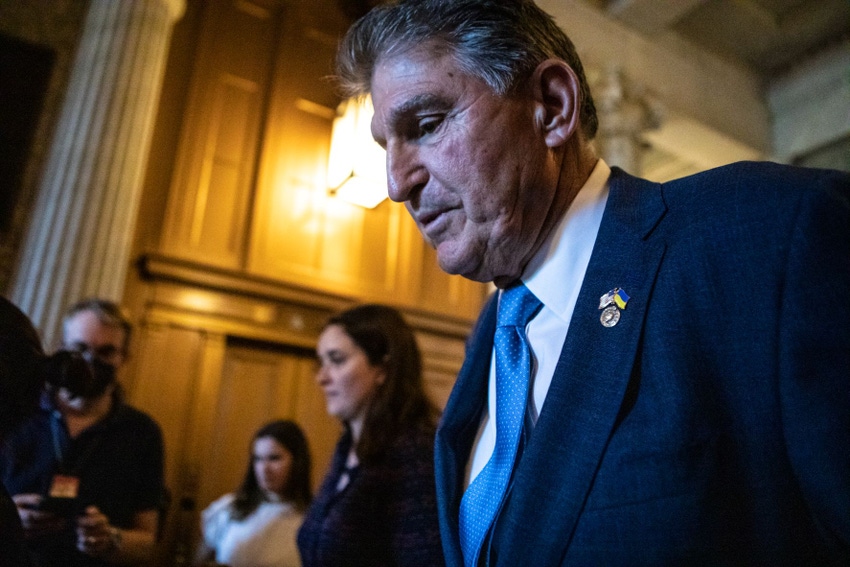Senate reconciliation provides major conservation funding
Legislative Watch: $40 billion for ag programs; USDA proposes rule on organic livestock and poultry standards; Next Generation Fuels Act.

Congress passed the $740 billion "Inflation Reduction Act" that addresses climate change, lower health-care costs, increases taxes on some billion-dollar corporations and reduces the deficit. The bill passed both the Senate and House on party-line votes.
It provides the largest investment of $370 billion to reduce greenhouse gas emissions by 40% from the 2005 levels by 2030. This includes a major increase in farm bill conservation programs.
The bill allows the Medicare program to negotiate prescription drug prices with pharmaceutical companies. The savings would be used to lower costs for seniors on medications, including a $2,000 out-of-pocket cap for older adults buying prescriptions from pharmacies. It also extends subsidies for health insurance under the Affordable Care Act.
The bill is funded by a new 15% corporate minimum tax and a 1% excise tax on companies' stock buybacks. The bill provides the IRS $80 billion for taxpayer services, enforcement and modernization, which is estimated to raise $203 billion in new revenue.
The bill will pay for the new investments and programs with $300 billion left over to go towards lowering the national debt.
The bill provides $40 billion for agricultural programs, with major increases in overly subscribed USDA conservation program. This includes:
$8.45 billion for the Environmental Quality Incentives Program.
$6.75 billion for the Regional Conservation Partnership Program.
$3.25 billion for the Conservation Stewardship Program.
$1.4 billion for the Agricultural Conservation Easement Program.
$9.7 billion in grants and loans to rural electric cooperatives for renewable energy projects.
$1.965 billion to the Rural Energy for America Program.
$1 billion for forgivable Section 317 loans for electric generation from renewable energy resources for resale to rural and nonrural residents.
Direct pay credits for rural electric cooperatives investing in renewables, which would bring the tax-exempt entities into parity with for-profit counterparts.
$500 million for blender pumps and biofuels infrastructure.
$1 per gallon tax credit for biomass-based diesel extended through 2024 and then replaced by the clean fuels tax credit that would vary according to the carbon rating of the biofuel. The clean fuels tax credit would be through 2027.
$3.1 billion in assistance to "distressed" borrowers who hold direct or guaranteed farm loans.
$2.2 billion in payments to farmers who had experienced discrimination in USDA loan programs (payments capped at $500,000 per producer).
President Joe Biden is expected to sign the bill next week.
USDA proposes rule on organic livestock and poultry standards
The USDA Agricultural Marketing Service published its proposed rule updating organic livestock and poultry standards, which govern living conditions, care, transport and slaughter.
USDA said the new rule would "change the USDA organic regulations to promote a fairer and more competitive market for organic livestock producers, by making sure that certified USDA livestock products are produced to the same consistent standard."
AMS is hosting a virtual listening session on Aug. 19 from noon to 2 p.m. ET time to hear comments regarding the rule. Also, written comments will be accepted through Oct.11.
More information can be found here.
Next Generation Fuels Act introduced in Senate
Senator Chuck Grassley (R-IA) has introduced the Next Generation Fuels Act which increases gasoline octane to a minimum standard through low-carbon, renewable fuels.
Grassley said, "The Next Generation Fuels Act would gradually ramp up the use of homegrown ethanol at gas stations across the country, making Americans less reliant on foreign oil and less vulnerable to the anti-competitive tactics of OPEC. As we look to the future of liquid fuels, this legislation can play a critical role in restoring energy independence, saving consumers money, lowering carbon emissions and expanding the market for farmers and ethanol producers."
Other cosponsors are Senators Joni Ernst (R-IA), Tammy Duckworth (D-IL) and Amy Klobuchar (D-MN).
Representative Cheri Bustos (D-IL) introduced the legislation in the House of Representatives in 2021.
Source: P. Scott Shearer, who is solely responsible for the information provided, and wholly owns the information. Informa Business Media and all its subsidiaries are not responsible for any of the content contained in this information asset. The opinions of this writer are not necessarily those of Farm Progress/Informa.
About the Author(s)
You May Also Like



